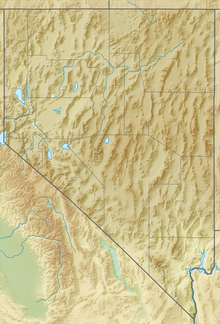| Jackson Mountains | |
|---|---|
 King Lear Peak from Sulphur | |
| Highest point | |
| Peak | Unnamed peak |
| Elevation | 2,772 m (9,094 ft)[1][2] |
| Geography | |
| Country | United States |
| State | Nevada |
| District | Humboldt County |
| Range coordinates | 41°19′24.642″N 118°29′49.578″W / 41.32351167°N 118.49710500°W |
| Topo map | USGS Parrot Peak |
The Jackson Mountains are a north-northeast trending mountain range in southwestern Humboldt County, Nevada. The range is flanked on the west by the Black Rock Desert and the Black Rock Range beyond. To the north across the Quinn River and Nevada State Route 140 lie the Bilk Creek Mountains. To the northeast across Kings River Valley is the Double Mountains and to the east are the Sleeping Hills. To the southeast and south lie the Eugene and Kamma Mountains. The ghost town of Sulphur lies just southwest of the pass between the Jackson and Kamma ranges. Nevada State Route 49 (Jungo Road) and the Union Pacific railroad Feather River Route traverse this pass.[4]
The range is typical of the Basin and Range Province with isolated high mountains surrounded by downfaulted basins filled with sediments. The rocks of the range include Paleozoic sedimentary and metamorphic rocks intruded by Mesozoic igneous rocks and covered by Mesozoic and Cenozoic volcanic rocks.[5]
The highest peak in the range is Quinn Peak, reaching 9,085 ft (2,769 m).[6] Other mountain peaks include:[4]
- King Lear Peak 8842 ft[7]
- Parrot Peak 8448 ft
- Navajo Peak 7726 ft
- Buff Peak 7425 ft
- Deer Creek Peak 7106 ft
- Sugarloaf Knob 6214 ft
- White Peak 5285 ft
- ^ "Jackson Mountains High Point, Nevada". Peakbagger.com. Retrieved 2015-01-17.
- ^ "Jackson Mtn Range HP (NV)". SummitPost.org. Retrieved 2015-01-17.
- ^ "Jackson Mountains". Geographic Names Information System. United States Geological Survey, United States Department of the Interior. Retrieved 2009-05-04.
- ^ a b Nevada, DeLorme Atlas and Gazetteer, 8th ed. 2012, pp. 19-20, 27-28 ISBN 978-0-89933-334-2
- ^ Quinn, M.J., Wright, J.E., and Wyld, S.J., 1997, Happy Creek igneous complex and tectonic evolution of the early Mesozoic arc in the Jackson Mountains, northwest Nevada: Geological Society of America Bulletin, v. 109, no. 4 p. 461-482
- ^ "Quinn Peak". Geographic Names Information System. United States Geological Survey, United States Department of the Interior.
- ^ "King Lear Peak". Geographic Names Information System. United States Geological Survey, United States Department of the Interior. Retrieved 2019-06-06.
